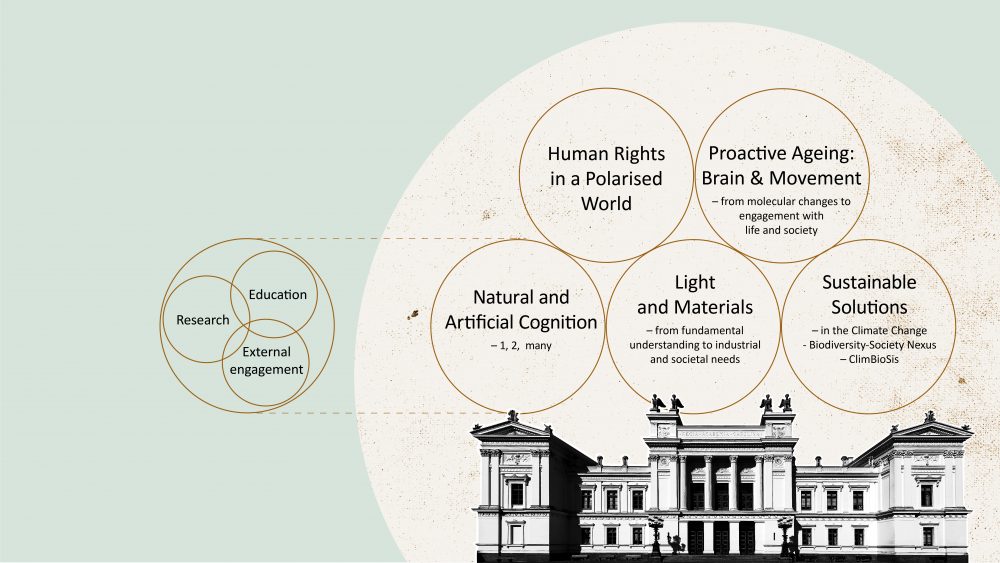Summary
On 23 June, Vice-Chancellor Erik Renström decided that Lund University will have five profile areas for the period 2022-2030.
On 23 June, Vice-Chancellor Erik Renström decided that Lund University will have five profile areas for the period 2022-2030. The profile areas are:
- Human Rights in a Polarised World
- Light and Materials – from fundamental understanding to industrial and societal needs
- Natural and Artificial Cognition: 1, 2, many.
- Proactive Ageing: Brain & Movement – from molecular changes to engagement with life and society
- Sustainable Solutions in the Climate Change – Biodiversity – Social Nexus – ClimBioSis
The selection of these five profile areas is the result of a long process. Following the announcement in the Swedish research bill in December 2020 that funding will be allocated to profile areas, the Vice-Chancellor’s Management Council started to discuss profile areas in February 2021. In March 2021, the RQ20 report was published, which among other things stated that Lund university should be better at using its full potential for interdisciplinary research. According to RQ20 the University needs to highlight excellence and develop strategic research environments. Following extensive discussions, an internal call for notifications of interest in becoming a profile area at Lund University was published in November 2021.
Of the 24 notifications of interest submitted, 11 were invited for interviews by a panel and asked to submit supplementary information on research, external engagement, societal impact and education. The panel consisted of one dean or vice dean per faculty, student representatives and three international “critical friends”[i] with myself as chair. During May 30th and 31st the panel interviewed representatives for the 11 proposed profile areas. On June 1st, the panel jointly reflected on the interviews and assessed each proposal.
Besides grading each proposal, the panel made some general observations worth mentioning also here. “The panel was impressed by the high quality of the research in the proposed profile areas.” All proposals were graded possible, good or excellent as profile areas for Lund University, that is 3, 4 or 5, on a scale from 1 to 5.
The panel stated that it “noticed a generally strong interest in collaboration across disciplinary and faculty borders with different degrees of maturity.” It recommended that “the University and the faculties should work together to enhance the possibilities for interdisciplinary and cross-faculty collaboration in both research and education.” More specifically, the panel recommended “Lund University to continue with a process of defining and supporting profile areas.” Since also the deans and Lund University management sees a lot of potential in many of the proposals that were not selected this time, the Vice-Chancellor has today decided to give me that task to further develop the University’s process of selecting profile areas, so that the next round can be initiated in 2023.
While the University Management will emphasize profile areas and interdisciplinary research a lot during the years ahead in line with the recommendations in RQ20, most research will continue to take place in other research environments. Lund University will, through its faculties and departments, continue to support disciplinary research and research outside the profile areas and work to further develop its quality.
Going back to the five selected profile areas. They are all based on excellent research, with a distinct profile compared to what is done at other universities in Sweden or abroad. They all have ambitious plans for the future. They can show great collaboration with external partners and they have extensive connections to present education complemented with plans for new courses. Typical for the five profile areas is that several faculties are involved (4-6 per profile area). All faculties, except the Faculty of Fine and Performing Arts, are participating in at least two profile areas. The University Management is committed to work with the profile areas in order to ensure that researchers from the Faculty of Fine and Performing Arts are included in at least one profile area, in order to utilize this unique expertise at Lund University.
The five profile areas have today been assigned some resources to further develop and consolidate their work, but also to work together to form an integrated base for Lund University’s application for the national call foreseen in 2023. During the autumn, we will also jointly with the faculties, develop the governance and financial model for the profile areas.
Many researchers put a lot of efforts into initiating and developing the notifications. We should all work together to take advantage of the ideas, contacts and collaborations that emerged from this process. With we, I mean the University Management (me included), the faculties and the researchers involved. But, before we take on this task, I hope we will all have a relaxing summer.
/Per Mickwitz, Pro Vice-Chancellor.
[i] The three critical friends were: professor Heikki Mannila, Aalto University, professor Jens Oddershede, University of Southern Denmark, and professor Reinhilde Veugelers, KU Leuven

